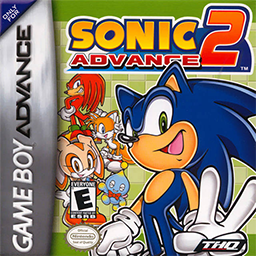
Sonic Advance 2 is a 2002 platform game developed by Dimps and published by Sega for the Game Boy Advance. It is an installment in the Sonic the Hedgehog series and the sequel to 2001's Sonic Advance. The story follows Sonic as he sets out to save his friends and retrieve the seven magical Chaos Emeralds from Dr. Eggman. Gameplay consists of the player completing various levels as one of five characters, each with their own unique attributes. After each zone is completed, the player faces Dr. Eggman in a boss battle.

Archer Maclean's Mercury is a 2005 puzzle-platform game for the PlayStation Portable developed by the eponymous British game programmer, Archer Maclean and Awesome Studios. In Mercury, the goal is to guide a drop of mercury to its appointed destination by tilting the stage, in a similar fashion to Super Monkey Ball. Levels come in different varieties that prioritize different methods of completing each level. The game was conceived when Archer Maclean used a previous minigame from Jimmy White's Cueball World and added a liquid metal physics. It was originally designed to have motion controls by using a tilt sensor peripheral for the PSP, but this version was never released due to technical constraints.

Exit is a 2005 puzzle video game developed and published by Taito for the PlayStation Portable. It was released in Japan, on December 15, 2005, in North America on February 14, 2006, in Australia on March 30, 2006, and in Europe on March 31, 2006. A version for Xbox Live Arcade was released on October 24, 2007. A version for the Nintendo DS was released in 2008 as Exit DS.
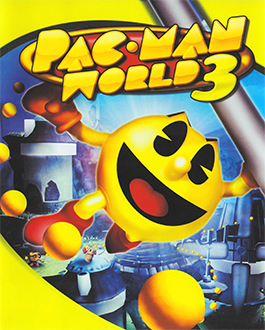
Pac-Man World 3 is a platform video game developed by Blitz Games and published by Namco for the PlayStation 2, GameCube, Xbox, PlayStation Portable, Nintendo DS, and Microsoft Windows. The Nintendo DS version was ported by Human Soft. Released in 2005, it is the third and final installment in the Pac-Man World trilogy and the only one to not be released in Japan. It also features a speaking Pac-Man for the first time ever outside of the cartoon series.
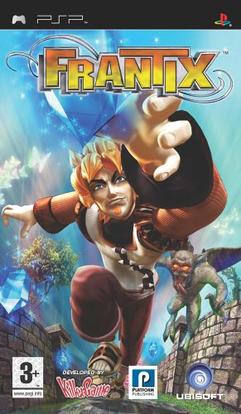
Frantix is a video game on Sony's PlayStation Portable developed by American studio Killer Game. The game contains over 150 levels. The player must race against the clock in order to solve each puzzle. Some levels are tricky and the most obvious path may not be the best route to go. In each level there are obstacles, deadly traps, hazards and creatures which can delay the player from completing the level.

Worms: Open Warfare is a 2D artillery tactical game. It was developed by Team17 and published by THQ for the PlayStation Portable and Nintendo DS. It is the first game in the Worms series to be released for seventh generation handheld consoles and marked the series' return to its original 2D gameplay style.

Need for Speed: Carbon is a 2006 racing video game and the tenth installment in the Need for Speed series. Developed by EA Black Box, Rovio Mobile and published by Electronic Arts, it was released on October 31, 2006, for the PlayStation 2, PlayStation 3, Xbox, Xbox 360, GameCube, Windows, and Mac OS X, and on November 19, 2006 as a launch title for the Wii and in 2008 for arcade cabinets. The game sees players conducting illegal street races within the fictional city of Palmont City, with the game's main story taking place after the events of Need for Speed: Most Wanted and focusing on the player's character taking control of the city from various street-racing gangs. While the gameplay is similar to its predecessor, Carbon introduced a number of new features, including crews and racing wingmen, Touge-styled racing events, and greater customization options.

Mercury Meltdown is a puzzle-platform game for the PlayStation Portable (PSP). It is the sequel to Archer Maclean's Mercury. Like the first game, the goal is to tilt the stage in order to navigate one or more blobs of mercury to the destination. In contrast to the original, Ignition Banbury had more time and experience developing the game and listened to player feedback, allowing the game to be easier and provide players with more freedom to choose levels. The game has new hazards, enemies, and minigames.
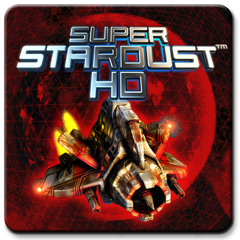
Super Stardust HD is a downloadable multidirectional shooter released for the PlayStation 3 by Sony Interactive Entertainment, developed by the Finnish company Housemarque. In Asian regions, it is known as Star Strike HD. In 2015, a port for the PlayStation 4, called Super Stardust Ultra, was released. In 2016, Super Stardust Ultra VR, a PlayStation VR compatible version that contains Super Stardust Ultra, was released for the PlayStation 4. It is also available as paid downloadable content for Super Stardust Ultra.

Worms: Open Warfare 2 is a 2007 2D tactical artillery and strategy video game developed by Team17 and Two Tribes, and published by THQ. The game is a direct sequel to Worms: Open Warfare and was released for the PlayStation Portable and Nintendo DS in 2007.

Crush is a 2007 puzzle-platform game developed by Kuju Entertainment's Zoë Mode studio and published by Sega for the PlayStation Portable. Its protagonist is Danny, a young man suffering from insomnia, who uses an experimental device to explore his mind and discover the cause of his sleeplessness. Each level of the game, representing events from Danny's life and inspired by artists such as Tim Burton and M.C. Escher, requires the player to control Danny as he collects his "lost marbles" and other thoughts.

Echochrome as is a 2008 puzzle game created by Sony's Japan Studio and Game Yarouze for PlayStation 3 from the PlayStation Store and for PlayStation Portable (PSP). The gameplay involves a mannequin figure traversing a rotatable world where physics and reality depend on perspective. The world is occupied by Oscar Reutersvärd's impossible constructions. This concept is inspired by M. C. Escher's artwork, such as "Relativity". The game is based on the Object Locative Environment Coordinate System developed by Jun Fujiki—an engine that determines what is occurring based on the camera's perspective.
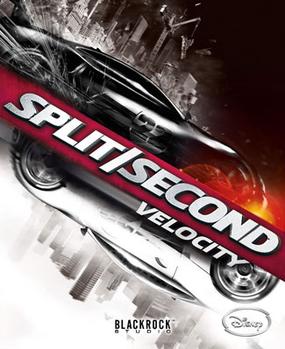
Split/Second: Velocity is a racing video game developed by Black Rock Studio and published by Disney Interactive Studios for Windows, PlayStation 3 and Xbox 360. The game was released in May 2010 and was later released for OnLive in June 2011.

Up is an action-adventure video game developed by Heavy Iron Studios and published by THQ. It is based on the Pixar film of the same name.

Over the Hedge: Hammy Goes Nuts! is a video game published by Activision based on characters from the film Over the Hedge. The Game Boy Advance (GBA) version, a miniature golf game, was developed by Vicarious Visions and released on October 10, 2006 in North America. The Nintendo DS and PlayStation Portable (PSP) versions, an action adventure game and a platform game respectively, were both developed by Amaze Entertainment and were released on October 24, 2006 and November 21, 2006. It is the second and last game to be based on the film.

Shift is a Flash game series created and developed by Antony Lavelle and published by Armor Games. The game has been ported to several platforms, including iOS and PlayStation Minis. The gameplay revolves around pressing the shift key to flip the room. The games have had critical success with Shift 2 having a score of 87/100 on Metacritic.

Snapshot is a platform game developed by Retro Affect and released on 30 August 2012 for Microsoft Windows and Mac OS X.
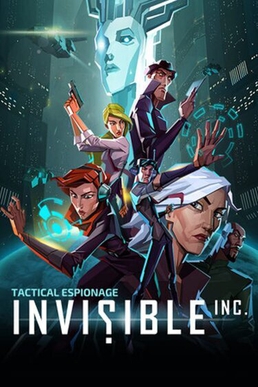
Invisible, Inc. is a turn-based tactics stealth game incorporating elements of roguelike gameplay, by Klei Entertainment. The player acts as the remote operator for an espionage agency that has come under attack from multinational corporations, and directs agents in covert missions, acquiring resources and support in order to enable relocation of the agency's computer system to a safe haven within a limited amount of time.
Enter the Gungeon is a 2016 bullet hell roguelike game developed by Dodge Roll and published by Devolver Digital. Set in the firearms-themed Gungeon, gameplay follows four player characters called Gungeoneers as they traverse procedurally generated rooms to find a gun that can "kill the past". The Gungeoneers fight against bullet-shaped enemies, which are fought using both conventional and exotic weapons. Enter the Gungeon features a permadeath system, causing the Gungeoneers to lose all obtained items and start again from the first level upon death. Between playthroughs, players can travel to an area called the Breach, where they can converse with non-player characters and unlock new items randomly encountered while playing.

The Pedestrian is a side scrolling puzzle-platform game developed and published by American studio Skookum Arts LLC. The game was originally released in January 2020 for Linux, macOS, and Microsoft Windows. In August 2020, a port for PlayStation 4 and PlayStation 5 was announced for January 2021, during a State of Play presentation. It later released for Xbox One and Xbox Series X/S in January 2022. It was eventually released on the Nintendo Switch in January 18, 2024.


















